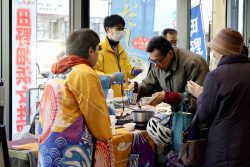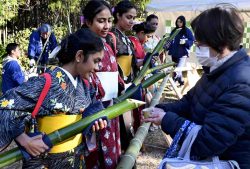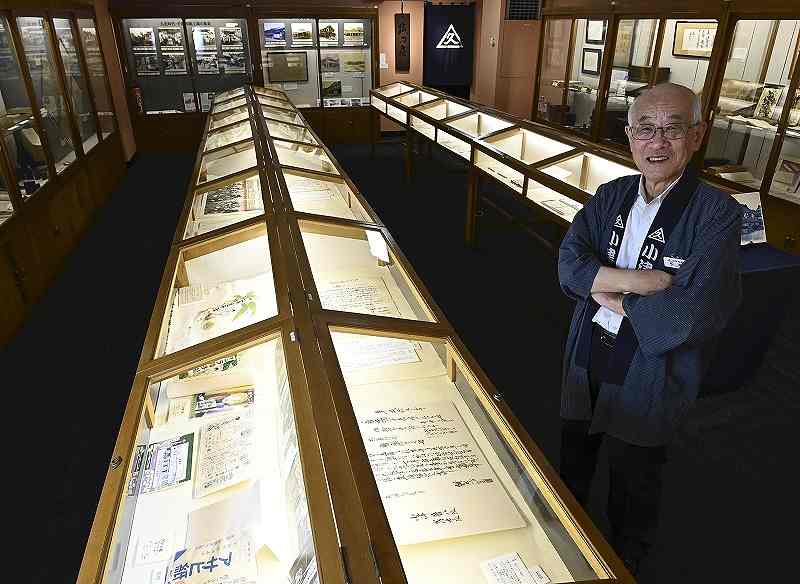
Setsuya Matsuura discusses the history of washi paper at the Ozu History Museum in Chuo Ward, Tokyo.
10:00 JST, October 5, 2022
The Ozu History Museum in Chuo Ward, Tokyo, lets you learn about the culture of Japanese washi paper, and the history of the washi trade through about 1,000 historical objects and documents.
The private museum was founded by Ozu Shoten Co., a wholesaler and retailer for washi, and is located along the Kyu Nikko Kaido road in the ward’s Nihombashi Honcho, a town rich in history and tradition.
When I stepped inside the museum, my eyes were drawn to strips of washi housed inside a glass showcase. The strips are called “hansatsu” and were used as paper money in the Kishu domain’s Matsuzaka fief during the Edo period (1603-1867).
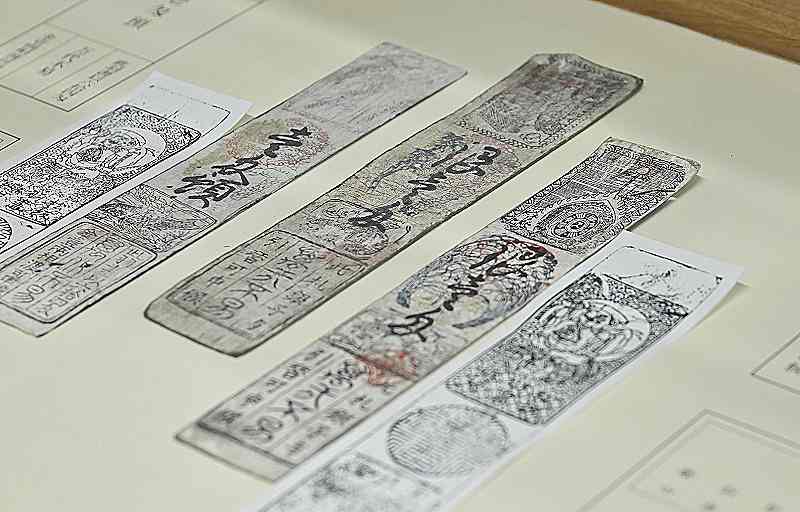
Hansatsu, which were used as paper money in the Kishu domain’s Matsuzaka fief during the Edo period
Ozu Shoten, which started as a paper wholesaler and made a fortune in that business, was entrusted with making the paper money. Deep inside the museum, there is also a signboard for a paper industry trade association called Kibo-gumi. These are just some of the objects in the museum that tell the story of how the washi industry developed from the Edo period to the Meiji era (1868-1912).
On the same floor there is also a display of kozo, a plant that serves as the base ingredient for washi, so that visitors can learn how washi paper is manufactured.
Papermaking is said to be one of the four great inventions of ancient China, alongside gunpowder, the compass and printing, but in recent years it has come to a major crossroad in its history. Letters have given way to instantaneous emails and social media posts as the main means of communication, and ebooks, which are less cumbersome than paper books, have become widely available. Accordingly, annual sales for the washi handled by Ozu Shoten have dwindled by about ¥80 million in four years from ¥199.75 million in the 12-month period from June 2017.
Perhaps paper, which has long contributed to the development of civilization, will at last lose its significance with the changing times.
However, Setsuya Matsuura, the director of the museum, objects to this line of thought.
“I think paper is still competitive when it comes to recording capability,” said Matsuura, 84.
He then pointed at a series of daifukucho account ledgers on display, which record business transactions made long ago by merchants. One of the key traits of washi is its durability. Looking at the ledgers with their still clearly legible entries, Matsuura’s words began to sound more and more convincing.
Other items on display include an age-worn senryobako coin storage box, old coins such as the Kanei Tsuho, introduced by the Tokugawa shogunate government, and a bundle of 1-mon coins, with strings running through holes in their centers to tie them together. Each object is an invaluable part of the historical record from which visitors can learn about trade and commerce in the Edo period.
“What we value most is the spirit of ‘onko chishin’ [learning something new by visiting something old]. I’d like to convey the appeal of washi and paper culture to children today, who are surrounded by digital things from a very young age,” Matsuura said emphatically.
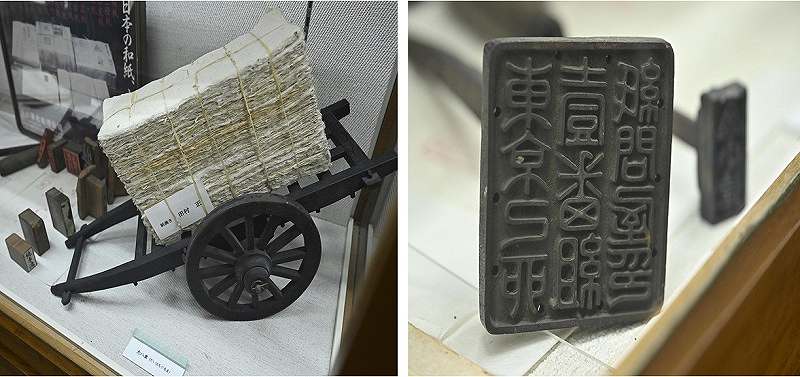
Left: A replica of a daihachiguruma cart for transporting washi during the Edo period Right: A branding iron for impressing a trade association seal on merchandise
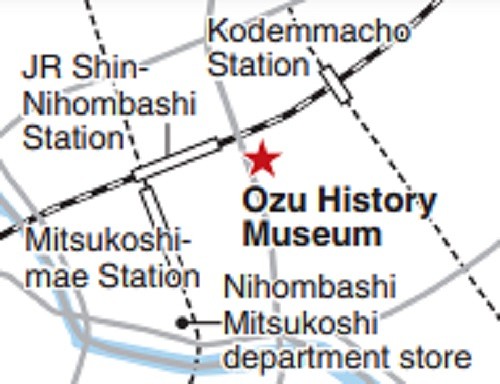
Ozu History Museum
Ozu Seizaemon Nagahiro started his paper business on this site in 1653. The museum, which is a two-minute walk from JR Shin-Nihombashi Station, showcases historical objects and documents related to the development of washi culture and the paper industry since the Edo period.
Address: 3-6-2 Nihombashi-Honcho, Chuo Ward, Tokyo
Hours: 10 a.m. to 6 p.m. Closed on Sundays and for the year-end and New Year’s holidays.
Admission: Free
Related Tags
Top Articles in Features
-

Sapporo Snow Festival Opens with 210 Snow and Ice Sculptures at 3 Venues in Hokkaido, Features Huge Dogu
-

Tokyo’s New Record-Breaking Fountain Named ‘Tokyo Aqua Symphony’
-

Tourists Flock to Ice Dome Lodge at Resort in Hokkaido, Japan; Facility Invites Visitors to Sleep on Beds Made of Ice
-

High-Hydration Bread on the Rise, Seeing Increase in Specialty Shops, Recipe Searches
-

Heirs to Kyoto Talent: Craftsman Works to Keep Tradition of ‘Kinran’ Brocade Alive Through Initiatives, New Creations
JN ACCESS RANKING
-

Japan PM Takaichi’s Cabinet Resigns en Masse
-

Japan Institute to Use Domestic Commercial Optical Lattice Clock to Set Japan Standard Time
-

Israeli Ambassador to Japan Speaks about Japan’s Role in the Reconstruction of Gaza
-

Man Infected with Measles Reportedly Dined at Restaurant in Tokyo Station
-

Man Infected with Measles May Have Come in Contact with Many People in Tokyo, Went to Store, Restaurant Around When Symptoms Emerged


